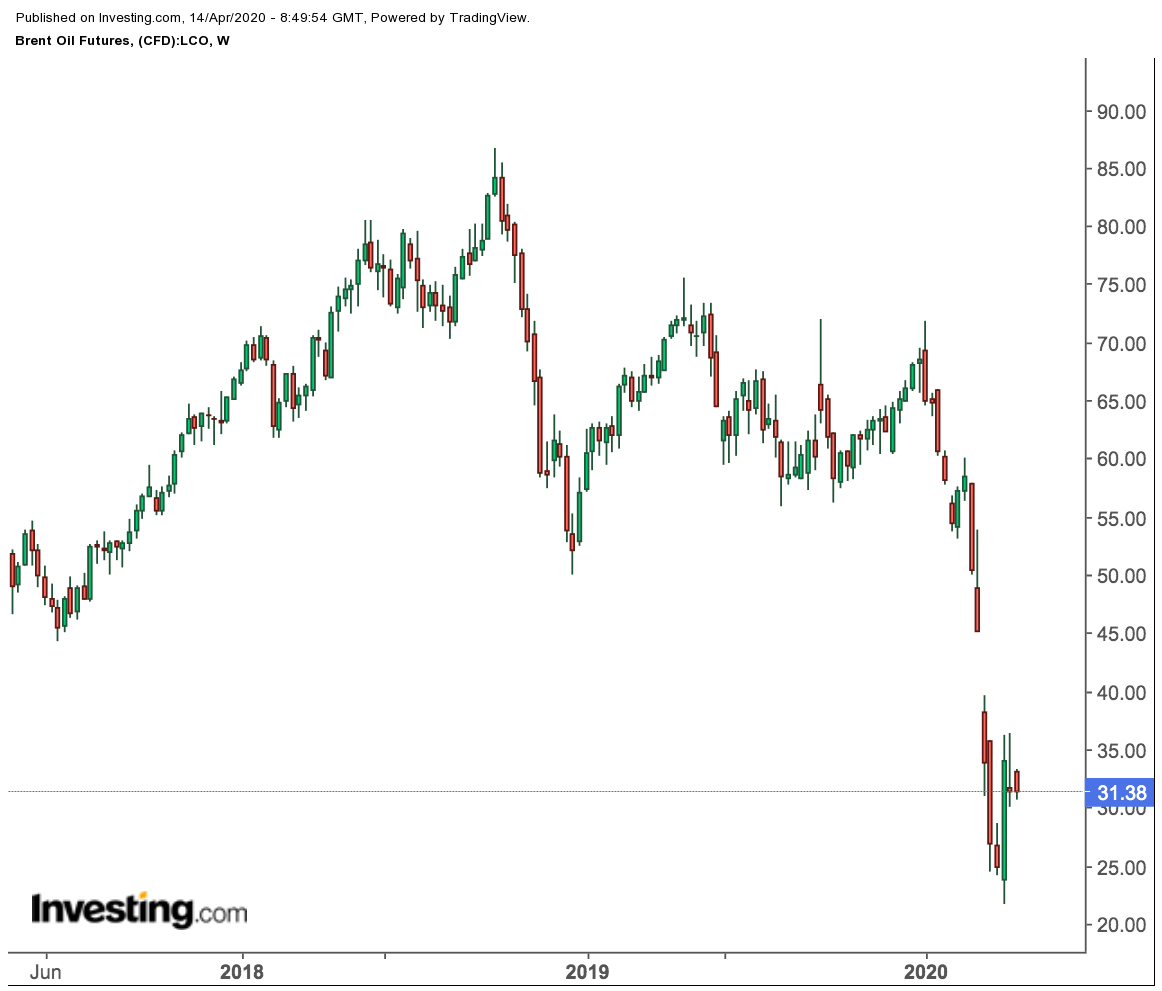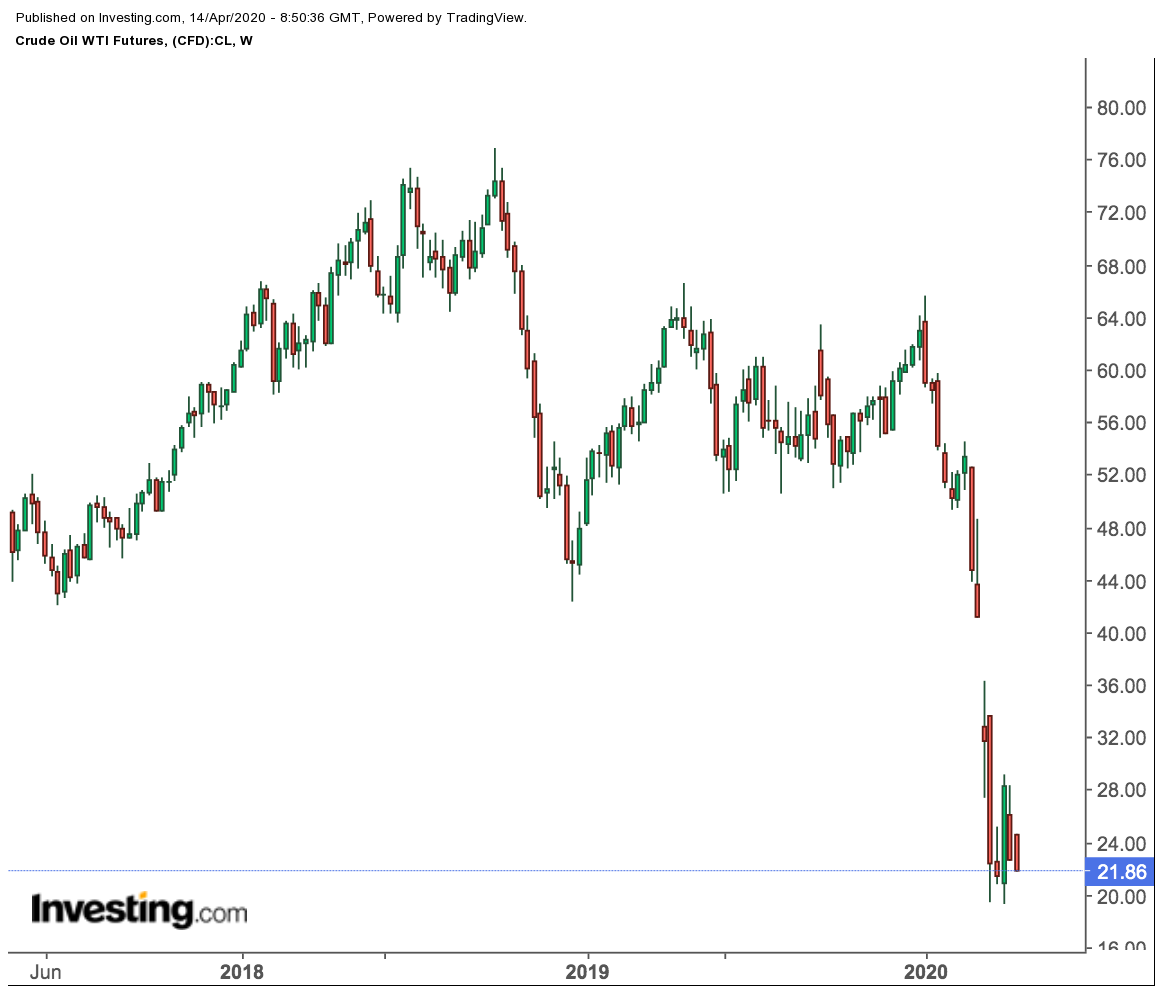You’d expect Donald Trump to say it, of course. The U.S. president wants to be seen as the savior of everything American, from jobs to oil. But to hear the Saudi Energy Minister state that he wishes to see the U.S. shale industry prosper and thrive — after starting a campaign just a month ago to destroy it — is like hearing a tiger roar that it’s gone vegetarian.
Prince Abdulaziz bin Salman’s well wishes for shale were made known on the same day that the U.S. Energy Information Administration made the somber deduction that the hydraulic fracturing, or “fracking,” industry — the engine behind America’s growth as the No. 1 oil producer — will suffer its biggest ever production loss this month.
According to the EIA, production from fracking in the seven major U.S. shale basins will drop by a record total of 194,000 barrels per day in April to reach around 8.7 million bpd as crude prices remain down more than 50% on the year.
Shale production has been sliding for several months. But April’s decline — followed by another 183,000 bpd fall anticipated by the EIA for May — will be the result of crude demand lost to the coronavirus pandemic and a glut worsened by Saudi production hikes.
Prying Away Market Share
Those Saudi builds were aimed at one thing only: prying away market share from Russian and U.S. crude exporters.
The Saudi offensive against Russia was to punish the Kremlin for walking away from an earlier production cut agreement in March — before the grand global deal announced last weekend.
In shale’s case, the strategy was deeper. It was to finish off an industry that Riyadh failed to crush during the first round of the 2014-2016 price crash.
That’s why it’s particularly difficult to swallow words like “family,” “prosper” and “thrive” when used in the same sentences with Russia and the U.S by Prince Abdulaziz.
Speaking in a phone interview with select media after Sunday’s hard-fought global deal to cut 9.7 million barrels a day in May and June, and continue with lower reductions until April 2022, the Saudi energy minister apparently said:
“A family remains a family, and within the household and within the family there are sometimes arguments, but they don't take them out to the street."
That was in reference to Russia.
Street Fight
But in the same breath, he conceded that Riyadh did make that “family” squabble a “street fight.”
“The only occasion that it was taken to the streets was 10 days ago,” Abdulaziz said in an excerpt of the interview reproduced by New York-based Energy Intelligence. He was referring to his war of words with Russian President Vladimir Putin on April 5 that nearly scuttled the deal reached on Sunday. Putin had remarked that it was the Saudis who were being difficult at the March OPEC talks with Russia — something the prince didn’t take kindly to.
“But with that sense of family — that was in the end transformed into a much more pleasant ending than you could have seen,” the Saudi minister continued in the interview. “If it wasn't for the serious collaboration with our friends in Russia, this deal would not have been happening.”
The prince parsed the U.S. situation just as smoothly.
“I made it clear that it was not on our radar or our intention to create any type of damage to their industry,” he said. “My belief is that once this market stabilizes, and given the nature of shale oil and the shale industry, that they will be able to recover as the market recovers, as the world economy recovers.”
“So I have no single doubt in the mind that in the future, they will rise again from the ashes and thrive and prosper. As Saudi Arabia, we wish them well, we look forward to higher demand for oil. I think the market with higher demand will be able to allow shale producers to prosper and thrive.”
The Saudi minister added that this was “well explained” to the various U.S. senators he had a conversation with on Saturday. What he didn’t say was that the senators — Republicans partisan to Trump — had threatened to remove American troops protecting Saudi Arabia and impose tariffs on Saudi crude imported by the United States, unless, of course, Riyadh agreed to reduce the glut it had worsened in the market.
There’s no evidence that the threat from the senators had any impact on the Saudi decision making leading into the weekend.
“U.S. Not The Broker”
But one thing was clear: Abdulaziz had no intention of making Trump look like the runaway winner from the deal or the person who actually made it all happen.
This was particularly important in order not to compromise Saudi sovereignty over the matter — i.e. not to create the appearance of conceding to American pressure. Even more crucial, was ensuring no perception of any “weakness” on the part of his younger brother — the all-powerful Crown Prince Mohammad bin Salman, whom Abdulaziz described as his “boss.”
“The U.S. was not the broker of the deal,” Abdulaziz said.
“The U.S.. reached out to make sure that we have a trilateral agreement. It's not about brokering a deal, as if we are not communicating and interacting with our friends from Russia. It was a situation that required the attendance of Saudi [Arabia], Russia and the U.S. We had to do the work. Each one had to do their work according to their national circumstances.” he said.
However, to prevent the Saudis from looking like ingrates, the prince added: “I must say we are very grateful for the U.S.' role in bringing people together.”
All Have To Cut As Promised
He then returned to reminding Trump of the president’s promises that U.S. production will drop between 2 million and 3 million barrels per day.
“I would not question what the U.S. would do and promised to do,” he said.
“We hope that the situation will improve to the extent that we will scale back the cuts. If it doesn't improve, we will look at the situation and see if we can extend these current cuts, or whatever it is. Our hope and our wish is that the situation will improve, and then we have to see our trajectory. One way forward is that we are scaling down our reduction.”
But will shale be able to drop its production as dramatically as the Saudis and rest of industry expect?
On the surface of it, yes. Aside from the sheer drop in April-May output forecast by the EIA, the weekly U.S. rig count will be another good indicator to tell.
The data published each Friday by industry firm Baker Hughes has shown a staggering drop of 179 oil rigs — or 26% — over the past four weeks to 504. Even so, the rig count remains about 60% above the May 2016 low of 316.
Rig Count To Continue Falling
Many analysts expect the slide in rigs to continue in coming weeks as U.S. drillers embark on serious capital expenditure cuts. Some 30% of shale drillers are expected to go out of business if U.S. crude prices do not rebound soon from the low $20 levels, analysts warn. And that could be a problem with the demand lost to the COVID-19 pandemic estimated at 30 million bpd versus 10 million bpd of cuts from the global deal.
Yet, within the production declines forecast by the EIA was a paradox that was uniquely shale’s.
Despite the EIA’s expectations for lower shale oil output this year, the agency forecast a record high production of 13.1 million bpd for U.S. crude production as a whole in weekly estimates released as late as March 13.
Analysts pinned the disconnect on the rapidly-improving efficiency in fracking, which was producing three times more crude now than in 2014.
“The U.S. upstream sector is currently deploying 504 or 68.7% fewer drilling rigs but is producing 3,525,000 bpd (39.7%) more oil than it was producing in October of 2014,” Dominick Chirichella, founder of the Energy Management Institute in New York, said in a note on Friday.
Shale Will Survive
Goldman Sachs analyst Damien Courvalin said in a March 31 note that “the bruised and battered U.S. shale industry is poised to emerge from the oil crash a winner.”
“Shale’s high-pressured wells and short drilling time mean the industry is well-positioned to benefit if the current plunge in oil causes long-term damage to production capacity, resulting in a price jump when demand returns,” Courvalin added.
Daniel Yergin, a Pulitzer Prize-winning oil historian and vice chairman of IHS Markit Ltd. adds a profound observation in an interview with Bloomberg:
“Companies go bankrupt, but rocks don’t go bankrupt. When this all shakes out, there will be other people to develop shale.”
